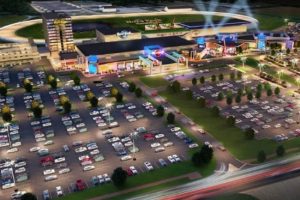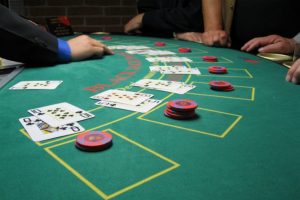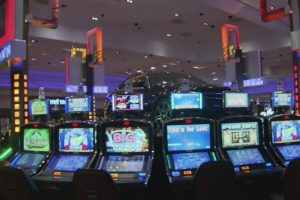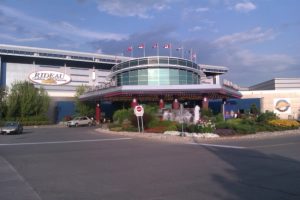 Hard Rock International and the owners of Rideau Carleton Raceway in Ottawa, Ontario are partnering in a joint venture to renovate and expand the horse track. Earlier this month, the new operators of the raceway have unveiled more details about their plans to modernize the gambling property and transform it into a full-fledged entertainment complex.
Hard Rock International and the owners of Rideau Carleton Raceway in Ottawa, Ontario are partnering in a joint venture to renovate and expand the horse track. Earlier this month, the new operators of the raceway have unveiled more details about their plans to modernize the gambling property and transform it into a full-fledged entertainment complex.
The C$318-million expansion of the entertainment facility includes the construction of an eight-storey hotel, a concert venue, bars and restaurants. The whole project consists of three phases, which are expected to be completed in 2024. It is interesting to mention that Hard Rock focused on providing a number of non-gambling amenities. The new owners of the raceway intend to turn the property into a modern complex with a hotel, residential, food and beverage, and entertainment facilities, including a casino that is to occupy more than 13,000 square meters with additional slot machines and table games.
Last year, the Ontario Lottery and Gaming Corporation (OLG) announced that Hard Rock Casino Ottawa partnership (that consists of Hard Rock International’s HR LP Investor Inc. and Rideau Carleton Raceway’s RCR Investor Inc.) will take over day-to-day operations of OLG slots at Rideau Carleton Raceway as part of its modernization plan. Under the city’s zoning, the new owners of the property are allowed to add up to 21 gaming tables to the 1,250 slot machines. City councilors reiterated their stance on the matter that they will support an Ottawa casino, providing that the new owners of the raceway comply with the cap policy.
Hard Rock Breaks Promise to Stick to Ottawa’s Zoning Rules
 Shortly after Hard Rock Casino Ottawa received the go-ahead to implement the ambitious casino expansion project, Hard Rock applied to expand the allowed number of gaming tables from 21 to 35. The casino operator applied to the committee of adjustment, a quasi-judicial body responsible for authorizing minor changes to zoning rules. However, Hard Rock’s application stirred up the hornet’s nest as it was interpreted as a sneaky move aiming at undermining Ottawa city council’s authority.
Shortly after Hard Rock Casino Ottawa received the go-ahead to implement the ambitious casino expansion project, Hard Rock applied to expand the allowed number of gaming tables from 21 to 35. The casino operator applied to the committee of adjustment, a quasi-judicial body responsible for authorizing minor changes to zoning rules. However, Hard Rock’s application stirred up the hornet’s nest as it was interpreted as a sneaky move aiming at undermining Ottawa city council’s authority.
City councilors argued that the casino operator looks for a permission to increase the allowed number of gaming tables by 67%, which is not a minor divergence to the aforementioned land zoning rules. City councilors spearheaded by Councillor Diane Deans pressed the panic button, pointing out that the expanded gambling options would trigger traffic and transportation issues.
Hard Rock, on the other hand, pushed back against councilors’ claims, explaining that the addition of 14 more tables will lead to no external changes to the building. Last November, the local Committee of Adjustment approved Hard Rock’s application, allowing the company to propel the number of allowed gaming tables to a total of 35.
According to the latest updates, the company now seeks the approval of the City Council to add 20 more gaming tables for a total of 55. Needless to say, the casino operator seeks to expand gambling options in search for more revenue.
The Truth Behind the Slot Machines Cap Policy in Ottawa
 The table cap is designed to control the healthy growth of the gaming industry and address responsible gambling issues. However, the saga related to the number of the allowed gaming tables at the horse track is barely something new for people, who keep track on the development of the gambling market in Ottawa. What came out of the blue was the announcement that there is no cap policy on the number of allowed slot machines at the raceway property. The news made the headlines just mere days ago causing utter confusion and perplexity.
The table cap is designed to control the healthy growth of the gaming industry and address responsible gambling issues. However, the saga related to the number of the allowed gaming tables at the horse track is barely something new for people, who keep track on the development of the gambling market in Ottawa. What came out of the blue was the announcement that there is no cap policy on the number of allowed slot machines at the raceway property. The news made the headlines just mere days ago causing utter confusion and perplexity.
In 2013, the City Council approved a new revenue-sharing agreement with the OLG, asking the corporation to set a cap on the maximum number of slot machines and gaming tables. Rideau-Rockcliffe Coun. Tobi Nussbaum commented that in a letter of 8th October 2013, OLG confirmed that it will comply with the Council’s request to allow a maximum of 1,250 slots and 21 gaming tables at the raceway, even though the rule is not written on a stone. Almost 5 years later, it seems that the OLG and the City Council did not speak the same language when it comes to the cap policy.
Only a week ago, Ottawa councilors found out that there is no slot machine limit at the Rocksino as the number of slot machines is not part of the zoning for the raceway property. OLG spokesman Tony Bitonti explained that last September, the local officials agreed to reassert the raceway as the city’s gaming site. In that sense, OLG’s commitment on the number of slots dropped off the table. This means that Hard Rock does not need the city’s permission to add 750 slot machines in the second phase of the project.
It is interesting to note that the slot machines revenue has helped the raceway to bail out the struggling horse racing industry in Ontario and fund the races. In that sense, the slot machines revenue has thrown Ontario’s ailing horse racing industry a lifeline. Revenue projections estimate that Ottawa will collect C$5.6 million thanks to the revenue-sharing agreement with the OLG. Adding more gaming options at the raceway means that the local government will shovel more money toward its coffers.
Casino Expansion Raises Concerns about Gambling Addiction
 Following the news about the lack of cap policy on the slot machines at Rideau Carleton Raceway, gambling opponents and skeptics argued that the dramatic increase of gambling options at the raceway may lead to an escalating addiction to gambling. However, Hard Rock casino proposal to boost the gambling options at the raceway is not likely to bow to the pressure applied by the anti-gambling crowd.
Following the news about the lack of cap policy on the slot machines at Rideau Carleton Raceway, gambling opponents and skeptics argued that the dramatic increase of gambling options at the raceway may lead to an escalating addiction to gambling. However, Hard Rock casino proposal to boost the gambling options at the raceway is not likely to bow to the pressure applied by the anti-gambling crowd.
According to various studies, slot machines play a key role in gambling addiction as players usually enter into a trance while monotonously pressing the spin button. It was estimated that the slot machines have accounted for 80% of the money earned from gambling. It is yet too early to say whether the casino expansion will breed gambling addiction in Ottawa, but Canada definitely needs an aggressive problem gambling policy.



















